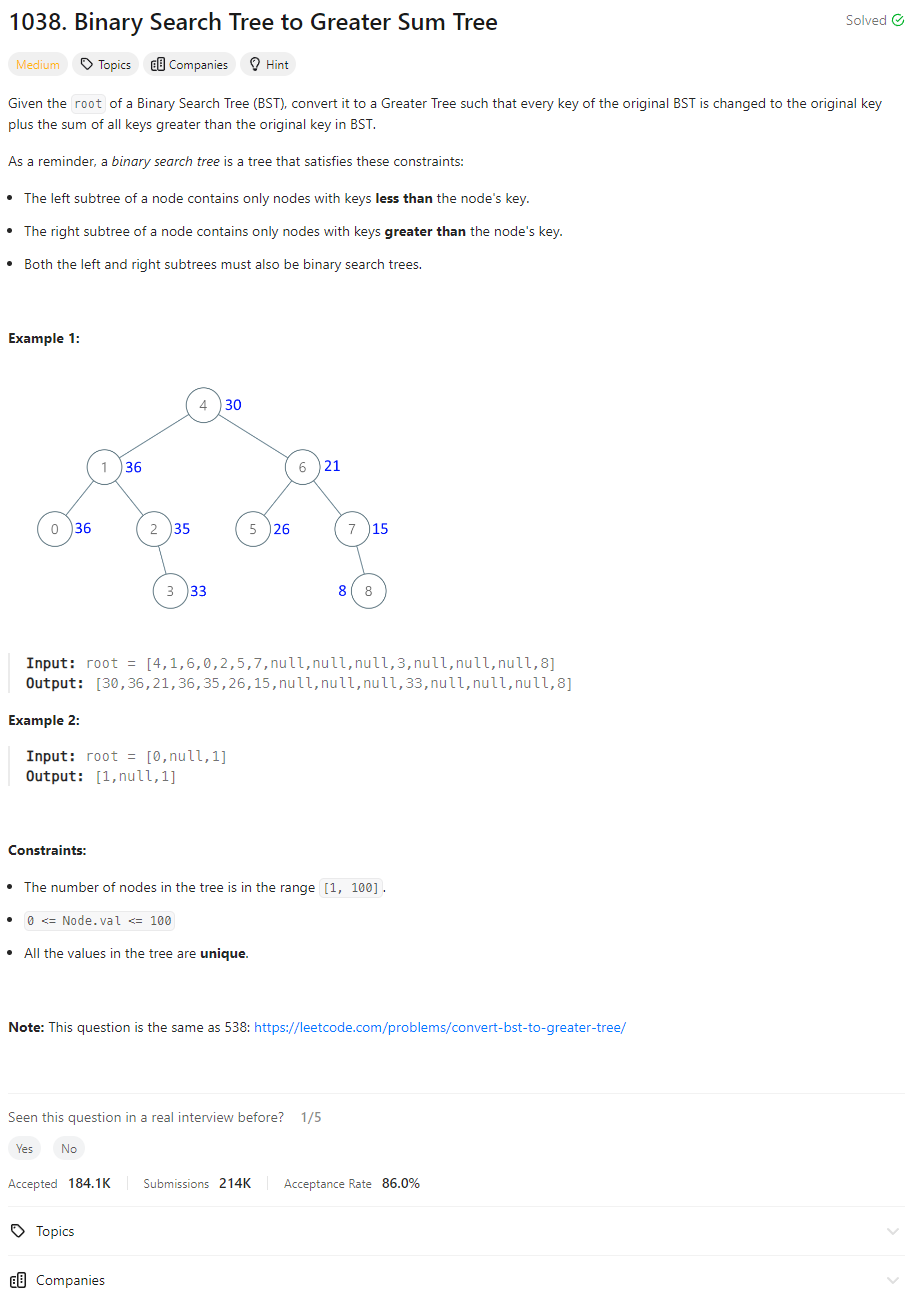Problem of The Day: Binary Search Tree to Greater Sum Tree
Problem Statement

Intuition
My first thought was to leverage an in-order traversal to accumulate the values of the nodes in a list. Then, by reversing this list, I could transform it into a format where I can easily compute the cumulative sums needed for converting a Binary Search Tree (BST) into a Greater Sum Tree (GST).
Approach
- Traverse the tree in in-order and collect the nodes in a list.
- Reverse the list to get the nodes in descending order.
- Iterate through the reversed list and update each node’s value to be the sum of its value and all previously visited nodes’ values.
Complexity
-
Time complexity: \(O(n)\) because we visit each node once during the traversal and the summing process.
-
Space complexity: \(O(n)\) due to the extra space used for the list to store the nodes during the traversal.
Code
# Definition for a binary tree node.
# class TreeNode:
# def __init__(self, val=0, left=None, right=None):
# self.val = val
# self.left = left
# self.right = right
class Solution:
def bstToGst(self, root: TreeNode) -> TreeNode:
temp = []
def helper(node):
if not node:
return
helper(node.left)
temp.append(node)
helper(node.right)
helper(root)
temp.reverse()
for i in range(1, len(temp)):
temp[i].val += temp[i - 1].val
return root
Editorial
Approach 1: In-order Traversal (Brute-Force)
class Solution:
def bstToGst(self, root):
# Store the inorder traversal in an array.
self.inorder_traversal = []
self.inorder(root)
# Reverse the array to get descending order.
self.inorder_traversal.reverse()
# Modify the values in the tree.
self.replace_values(root)
return root
def inorder(self, root):
if root is None:
return
self.inorder(root.left)
self.inorder_traversal.append(root.val)
self.inorder(root.right)
# Function to modify the values in the tree.
def replace_values(self, root):
if root is None:
return
self.replace_values(root.left)
self.replace_values(root.right)
# Replace node with values greater than the current value.
node_sum = 0
for i in self.inorder_traversal:
if i > root.val:
node_sum += i
else:
break
root.val += node_sum
Approach 2: Reverse In-order Traversal
class Solution:
def bstToGst(self, root):
node_sum = [0] # Using a list to emulate a mutable integer reference
self.bst_to_gst_helper(root, node_sum)
return root
def bst_to_gst_helper(self, root, node_sum):
# If root is null, make no changes.
if root is None:
return
self.bst_to_gst_helper(root.right, node_sum)
node_sum[0] += root.val
# Update the value of root.
root.val = node_sum[0]
self.bst_to_gst_helper(root.left, node_sum)
Approach 3: Iterative Reverse In-order Traversal
class Solution:
def bstToGst(self, root: TreeNode) -> TreeNode:
node_sum = 0
st = []
node = root
while st or node is not None:
while node is not None:
st.append(node)
node = node.right
# Store the top value of stack in node and pop it.
node = st.pop()
# Update value of node.
node_sum += node.val
node.val = node_sum
# Move to the left child of node.
node = node.left
return root